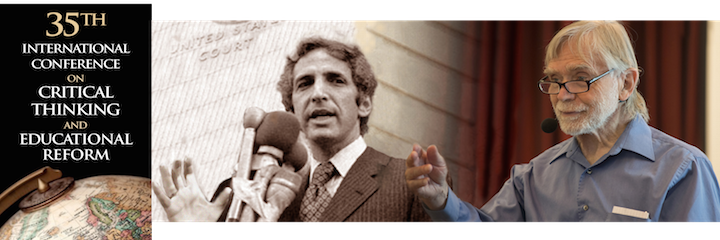
At the 35th International Conference on Critical Thinking
July 2015
Bertrand Russell Distinguished Scholar
The Bertrand Russell Distinguished Scholars Lecture Series highlights the work and thinking of distinguished thinkers within subjects, fields, disciplines, or about specific topics or issues. We honor the thinking, the philosophy and the contributions of Bertrand Russell through this series.
|

Bertrand Russell: An Exemplar of Critical Thought
Bertrand Russell was one of the most influential 20th century philosophers. In the following passages, he emphasizes the importance of open and free inquiry. He stresses the critical need to create education systems that foster fairminded pursuit of knowledge, and warns of the dangers inherent in dogmatic ideologies.
The conviction that it is important to believe this or that, even if a free inquiry would not support the belief, is one which is common to almost all religions and which inspires all systems of state education...A habit of basing convictions upon evidence, and of giving to them only that degree of certainty which the evidence warrants, would, if it became general, cure most of the ills from which the world is suffering. But at present, in most countries, education aims at preventing the growth of such a habit, and men who refuse to profess belief in some system of unfounded dogmas are not considered suitable as teachers of the young…
The world that I should wish to see would be one freed from the virulence of group hostilities and capable of realizing that happiness for all is to be derived rather from cooperation than from strife. I should wish to see a world in which education aimed at mental freedom rather than at imprisoning the minds of the young in a rigid armor of dogma calculated to protect them through life against the shafts of impartial evidence. The world needs open hearts and open minds, and it is not through rigid systems, whether old or new, that these can be derived. (Russell, 1957, pp. vi-vii).
In his book, Portraits from Memory , "Reflections on My Eightieth Birthday," Russell (1956) comments on the long-term nature of change and the importance of moving ever closer toward the creation of critical societies:
...beneath all this load of failure I am still conscious of something that I feel to be victory. I may have conceived theoretical truth wrongly, but I was not wrong in thinking that there is such a thing, and that it deserves our allegiance. I may have thought the road to a world of free and happy human beings shorter than it is proving to be, but I was not wrong in thinking that such a world is possible, and that it is worthwhile to live with a view to bringing it nearer. I have lived in the pursuit of a vision, both personal and social. Personal: to care for what is noble, for what is beautiful, for what is gentle; to allow moments of insight to give wisdom at more mundane times. Social: to see in imagination the society that is to be created, where individuals grow freely, and where hate and greed and envy die because there is nothing to nourish them. These things I believe, and the world, for all its horrors, has left me unshaken.
Russell (1919) also illuminates the fact that the vast majority of people today do not think critically, or indeed ethically, and that those who do will seek a "new system of society." He says:
The great majority of men and women, in ordinary times, pass through life without ever contemplating or criticising, as a whole, either their own conditions or those of the world at large. They find themselves born into a certain place in society, and they accept what each day brings forth, without any effort of thought beyond what the immediate present requires…they seek the satisfaction of the needs of the moment, without much forethought, and without considering that by sufficient effort the whole condition of their lives could be changed...It is only a few rare and exceptional men who have that kind of love toward mankind at large that makes them unable to endure patiently the general mass of evil and suffering, regardless of any relation it may have to their own lives. These few, driven by sympathetic pain, will seek, first in thought and then in action, for some way of escape, some new system of society by which life may become richer, more full of joy and less full of preventable evils than it is at present (p. viii).
Bertrand Russell’s thoughts and writings on social issues are intimately linked with the ideals of critical thinking and the concept of fairminded critical societies.
References:
Russell, B. (1919). Proposed Roads to Freedom . NY: Henry Holt and Co.
Russell, B. (1956). Portraits From Memory and Other Essays . New York: Simon and Schuster. Russell, B. (1957). Why I am Not a Christian . New York: Simon and Schuster.
For some of Russell’s views, in his own voice, click on the following video links
| • The Practice and Theory of Bolshevism • How Bertrand Russell was Prevented from Teaching at the College of the City of New York |